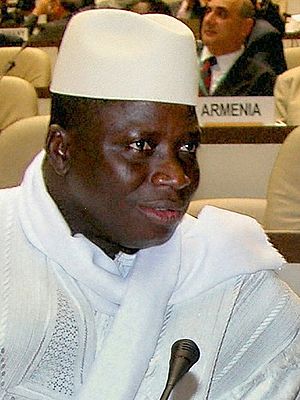 |
| President of The Gambia Yahya Jammeh, is often criticised of rights violations by human rights defenders (Photo credit: Wikipedia) |
On April 16, 2013, the tiny West African country’s National Assembly amended Section 114 of the Criminal Code which imposes a jail term of five years or a fine of D50, 000 (about USD1, 650) on persons convicted of giving false information.
The law previously allowed a jail term of not more than six months or a fine of D500 (about USD17) or both.
The Gambia Press Union is yet to issue a statement on the new law, but in a facebook update, its executive director, Gibairu Janneh lament: “It is a pity that whilst modern political trends demand accountability in governance through an independent, vibrant and pluralistic media, The Gambia is tightening the screws on its already muzzled press.”
“The Gambia today needs media law reform so as to enhance good governance, democracy and development and not using the law to suppress dissent,” Janneh wrote.
The Media Foundation for West Africa (MFWA) argues that “The offence of giving false information to a public servant has long been considered draconian and inconsistent with certain provisions of the country’s Constitution as well as provisions of other International and Regional Treaties to which Gambia is a signatory.”
In addition to the president, the new law also categorize the Vice President, Speaker, Deputy Speaker and members of the National Assembly as public officers.
But, the sub-regional press freedom and free expression advocacy agency said “The latest classification approved by the National Assembly is, however, inconsistent with Section 166 (4) of the country’s Constitution which does not recognise these officials as public officers”.
Several Gambians have been tried under this law including journalists, government officials and ordinary citizens. Some people have been accused, charged to court, convicted or acquitted on this law for petitioning the President, Yahya Jammeh in the past.
Concerns have been raised on social media that this new amendment does not only make it difficult for aggrieved Gambians to petition the executive, but also seized peoples’ right to freedom of expression and of the press.
On Tuesday, the minority members of the national assembly expressed their opposition to the new law, but, a ruling party majority ensured the law will come into force.
“The bill to amend false information law is controversial and draconian,” minority leader Hon. Samba Jallow said. “It should not be applicable to any democratic society, and The Gambia is not an exception.”
He said the amendments are unconstitutional. His peers in parliament, mainly of the majority ruling party, take his arguments for a laugh.
But, Hon Jallow warned: “You are laughing but this is applicable to anyone of us. You cannot exempt yourselves from quarrelling when it comes. We must be very careful with the laws that we formulate here.”
“The Gambian government has for many years weighed down citizens and the media with laws that criminalize speech, such as publication of false information, seditious libel and criminal defamation just to cow them from being critical of the government and its policies,” MFWA’s executive director Professor Kwame Karikari said.
The African Commission on Human and Peoples’ Rights (ACHPR) is currently holding its 53rd Ordinary Session in The Gambia, April 9-23. In March, 38 human rights NGOs petitioned the ACHPR to relocate from the Gambia, in protest against “the perpetually poor human rights record of the country”. They have since boycotted the 53rd session.
The MFWA is one of them, it call on the leadership of the ACHPR and participants at the session to speak out against “the massive violations in The Gambia and also petition President Jammeh to annul the new amendment” on the law of false information.
Last week, the Commission launch its newly adopted “Model Law on Freedom and Access to Information” in Banjul, The Gambian capital.
“The model law is aimed at promoting, protecting and developing a culture of human rights on the African Continent,” Mabedle Mushwana, Chairperson of the South African Human Rights Commission said on April 12.
It may also necessitate the amendments of existing pieces of legislation that would be found to be incompatible with this model law, he said.
THIS STORY FIRST APPEARED HERE, ON FRONT PAGE INTERNATIONAL (FPI)
Written by Modou S. Joof
Follow on Facebook: The-North-Bank-Evening-Standard











No comments:
Post a Comment
The views expressed in this section are the authors' own. It does not represent The North Bank Evening Standard (TNBES)'s editorial policy. Also, TNBES is not responsible for content on external links.